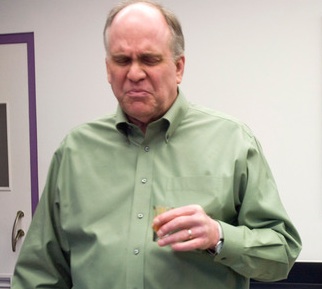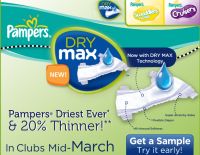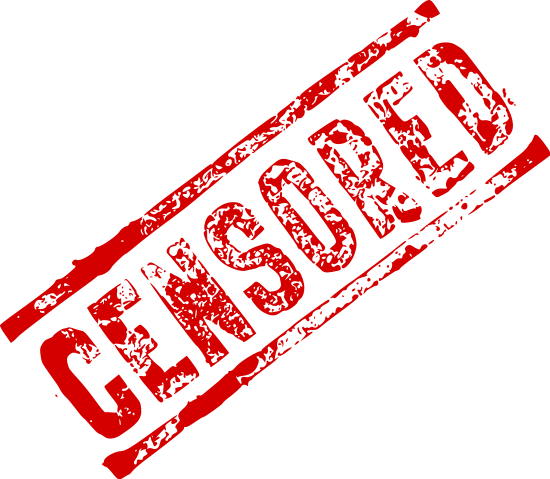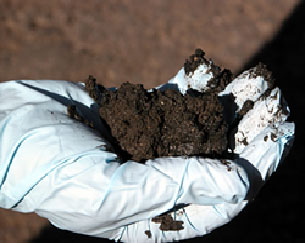"Gasland" Movie Explosive for Drilling Industry
Submitted by Anne Landman on

Submitted by Anne Landman on
One of the first things BP did after oil started gushing into the Gulf was to spray more than 1.1 million gallons of a dispersant with the optimistic name "Corexit" onto the oil. Then BP hired Louisiana fishermen and others to help with cleanup and containment operations. About two weeks later, over seventy workers fell sick, complaining of irritated throats, coughing, shortness of breath and nausea. Seven workers were hospitalized on May 26. Workers were engaged in a variety of different tasks in different places when they got sick: breaking up oil sheen, doing offshore work, burning oil and deploying boom. BP officials speculated that their illnesses were due to food poisoning or other, unrelated reasons, but others pointed out how unlikely these other causes were, since the sick workers were assigned to different locations.
Submitted by Anne Landman on
 Man tasting a salt-reduced version of Campbell's V8 juice (Credit: Jessica Kourkounis, the NY Times)Big food companies are using well-established public relations techniques to fight bad publicity over the high salt content in processed foods, employing strategies developed earl
Man tasting a salt-reduced version of Campbell's V8 juice (Credit: Jessica Kourkounis, the NY Times)Big food companies are using well-established public relations techniques to fight bad publicity over the high salt content in processed foods, employing strategies developed earl
Submitted by Anne Landman on
 The Campaign for Safe Cosmetics commissioned laboratory analyses (pdf) of 17 men's and women's name-brand perfumes to determine their chemical content, and found 38 secret chemicals present in all 17 products.
The Campaign for Safe Cosmetics commissioned laboratory analyses (pdf) of 17 men's and women's name-brand perfumes to determine their chemical content, and found 38 secret chemicals present in all 17 products.
Submitted by Anne Landman on
 Frame from video promoting Pakistan's dairy industry Pakistani television ads portray packaged milk as healthful, even sexy, and encourage parents to feed milk to their children, but
Frame from video promoting Pakistan's dairy industry Pakistani television ads portray packaged milk as healthful, even sexy, and encourage parents to feed milk to their children, but
Submitted by Anne Landman on
 When parents of toddlers started complaining that Procter & Gamble's new "Dry Max" Pampers were giving their kids severe diaper rash, Jodi Allen, P&G's Vice President for Pampers took prompt action -- and blamed the childrens' parents and social media for spreading false rumors about their products.
When parents of toddlers started complaining that Procter & Gamble's new "Dry Max" Pampers were giving their kids severe diaper rash, Jodi Allen, P&G's Vice President for Pampers took prompt action -- and blamed the childrens' parents and social media for spreading false rumors about their products.
Submitted by Anne Landman on
 Jessie Daniels, an Associate Professor in the Urban Public Health program at Hunter College, New York, has identified a phenomenon she calls "cloaked Web sites," or sites published by individuals or groups who deliberately conceal their authorship to disguise a hidden political agenda. Cloaked Web sites, Daniels points out, can have very real consequences, especially in the area of health.
Jessie Daniels, an Associate Professor in the Urban Public Health program at Hunter College, New York, has identified a phenomenon she calls "cloaked Web sites," or sites published by individuals or groups who deliberately conceal their authorship to disguise a hidden political agenda. Cloaked Web sites, Daniels points out, can have very real consequences, especially in the area of health.
Submitted by Anne Landman on
 The PBS television program Frontline selectively edited an interview with a single-payer health insurance advocate, and film footage of people protesting in support of single-payer, to make it look as though they were advocating a public option instead.
The PBS television program Frontline selectively edited an interview with a single-payer health insurance advocate, and film footage of people protesting in support of single-payer, to make it look as though they were advocating a public option instead.
Submitted by Anne Landman on
 After Hurricane Katrina struck New Orleans, thousands of Louisiana residents claimed to suffer respiratory problems after being housed in government trailers contaminated with formaldehyde.
After Hurricane Katrina struck New Orleans, thousands of Louisiana residents claimed to suffer respiratory problems after being housed in government trailers contaminated with formaldehyde.
Submitted by John Stauber on
 The pesticide and chemical industry front group American Council on Science and Health is lauding organic gardens advocate
The pesticide and chemical industry front group American Council on Science and Health is lauding organic gardens advocate
Center for Media and Democracy (CMD)
520 University Ave, Ste 305 • Madison, WI 53703 • (608) 260-9713
CMD is a 501(c)(3) tax-exempt non-profit.
© 1993-2025